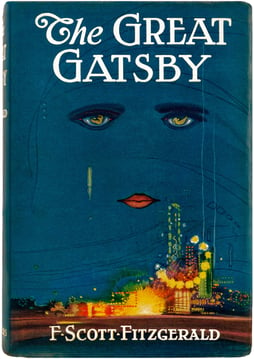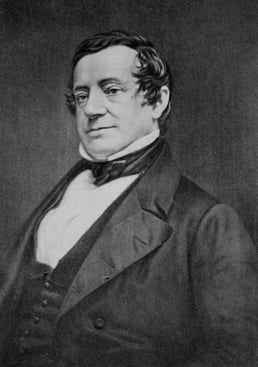New York is the next stop on our literary journey throughout the fifty states. Richly diverse in people and landscape, New York is a wealth of culture, activity, and beautiful scenery. From the hectic buzz of New York City to the beautiful forests and farms of upstate New York, which is full of amazing things to do and see. Today's novels span decades of American literature, showcasing both the city and rural areas throughout the history of the state. From the earliest days of America to modern city living, these books represent some of the best books set in New York. Join us as we take a closer look at The Empire State in this edition of our Top Books by State Series:
The Great Gatsby by F. Scott Fitzgerald
 F. Scott Fitzgerald's The Great Gatsby was first published in 1925. Often considered a Great American Novel, this beloved book set during the Jazz Era in fictional West Egg, New York, captures a time and sense of luxury that no longer exists but is synonymous with the time. Nick, Gatsby, and their friends jet set around a city that for many, remains the ultimate idea of New York City glamour. The following passage details Nick's lonely night in the bustling city:
F. Scott Fitzgerald's The Great Gatsby was first published in 1925. Often considered a Great American Novel, this beloved book set during the Jazz Era in fictional West Egg, New York, captures a time and sense of luxury that no longer exists but is synonymous with the time. Nick, Gatsby, and their friends jet set around a city that for many, remains the ultimate idea of New York City glamour. The following passage details Nick's lonely night in the bustling city:
I began to like New York, the racy, adventurous feel of it at night and the satisfaction that the constant flicker of men and women and machines gives to the restless eye. I like to walk up Fifth Avenue and pick out romantic women from the crowd and imagine that in a few minutes, I was going to enter their lives, and no one would ever know or disapprove. Sometimes, in my mind, I followed them to their apartments on the corners of hidden streets, and they turned and smiled back at me before they faded through a door into warm darkness. At the enchanted metropolitan twilight, I felt a haunting loneliness sometimes and felt it in others—poor young clerks who loitered in front of windows waiting until it was time for a solitary restaurant dinner—young clerks in the dusk, wasting the most poignant moments of night and life.
The City We Became by N.K. Jemisin
The City We Became by celebrated fantasy writer N.K. Jemisin centers around the idea that once a city reaches a certain size, it gains a soul. To protect that soul, an avatar is chosen to represent the city and defend it from forces that would destroy it. In the case of New York City, each borough chooses its avatar. The novel paints a picture of a diverse New York that is weight down by racism and mistrust, beautiful but lessened by commercialism and gentrification. The wide, diverse cast represents New Yorkers from numerous backgrounds, and even as it showcases the problems that exist within the city, it still exists as a love letter to one of the most amazing cities on the planet:
And around her, suddenly, joined and overlapping in a way that somehow does not create paradox or cause pain, are her kin. Bright Manhattan, tall and shining, but with the deepest of shadows between his daggerlike skyscrapers. Jittery, jagged Queens, pan-amorous in her welcome to all, genius in her creative hustle and determination to put down roots. Brooklyn is old, family-solid, a deep-rooted thing of brown stone and marble halls and crumbling tenements, last stop for the true-born of New York before they are forced into the wilderness of, horror of horrors, Long Island. And together, they turn and behold their lost sister at last: Staten Island. She is dim compared to their light, suburban where they are dense, thinly populated in comparison to their teeming millions. There are actually farms somewhere amid her substance. And yet. She bristles with tiny throwing daggers in the shape of ferries, and defensive fortifications built in semi-attached two-family blocks. They can feel the strength and attitude of her, blazing more brightly than any sodium lamp. She is so different, so reluctant… but whether she wants to be or not, and whether the rest of them are willing to admit it or not, she is clearly, truly, New York.
The Sketch Book by Washington Irving
 The New York depicted in The Sketch Book by Washington Irving, specifically in the short stories "The Legend of Sleepy Hollow" and “Rip Van Winkle," is quite different than the city setting of the other two books on our list. Washington Irving's famous stories represent some of the earliest examples of American literature. These short stories, set respectively in the Hudson River Valley and the Catskills, depict a more rural New York populated by Dutch immigrants and rich in supernatural folkloric dangers:
The New York depicted in The Sketch Book by Washington Irving, specifically in the short stories "The Legend of Sleepy Hollow" and “Rip Van Winkle," is quite different than the city setting of the other two books on our list. Washington Irving's famous stories represent some of the earliest examples of American literature. These short stories, set respectively in the Hudson River Valley and the Catskills, depict a more rural New York populated by Dutch immigrants and rich in supernatural folkloric dangers:
From "The Legend of Sleepy Hollow"
Not far from this village, perhaps about two miles, there is a little valley or rather lap of land among high hills, which is one of the quietest places in the whole world. A small brook glides through it, with just a murmur enough to lull one to repose, and the occasional whistle of a quail or tapping of a woodpecker is almost the only sound that ever breaks in upon the uniform tranquility.
And:
From "Rip Van Winkle"
Whoever has made a voyage up the Hudson must remember the Catskill Mountains. They are a branch of the great Appalachian family, and are seen away to the west of the river, swelling up to a noble height, and lording it over the surrounding country. Every change of season, every change of weather, indeed, every hour of the day, produces some change in the magical hues and shapes of these mountains, and they are regarded by all the goodwives, far and near, as perfect barometers.
At the foot of these fairy mountains the traveler may have seen the light smoke curling up from a village, whose shingle roofs gleam among the trees, just where the blue tints of the upland melt away into the fresh green of the nearer landscape. It is a little village of great age, having been founded by some of the Dutch colonists in the early times of the province, just about the beginning of the government of the good Peter Stuyvesant (may he rest in peace!), and there were some of the houses of the original settlers standing within a few years, built of small yellow bricks brought from Holland, having latticed windows and gable fronts, surmounted with weathercocks.









